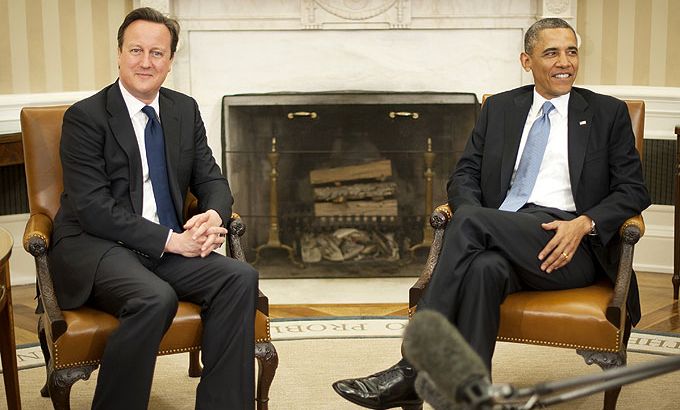Obama and Cameron discuss Syria crisis
Meeting in White House, US president and UK prime minister pledge to work together to increase pressure on Assad regime.

US President Barack Obama says he and British Prime Minister David Cameron have agreed to “increase the pressure” on Syrian President Bashar al-Assad, with the aim being Assad’s departure.
Obama and Cameron addressed the media after a meeting between the two leaders in Washington on Monday.
“We’re going to continue our efforts to increase pressure on the Assad regime, to provide humanitarian aid … to strengthen the moderate opposition and to prepare for a democratic Syria without Bashar al-Assad,” Obama said.
Al Jazeera’s Patty Culhane, reporting from Washington DC, said that while there was a lot of talk in local media about the possibility of arming the rebels, there were concerns about which country was arming which Syrian rebel group.
She said it would be a tough battle if the Obama administration decides to arm the rebels.
Cameron said he ruled out tougher action in Syria but pledged to double non-lethal aid to Syria.
Under pressure
Our correspondent said there was no real change in position from the statements made by the two leaders.
She said the Obama administration is under a lot of pressure as some rebels groups are believed to be linked to al-Qaeda.
Obama has also said publicly that the use of chemical weapons would be the “red line” that would have to be crossed for the US to reconsider its position.
Cameron, fresh from a trip to Moscow, one of Assad’s few remaining backers, said the US efforts that had convinced Russia to join a conference on a political transition in Syria were a significant step forward.
He told National Public Radio that John Kerry, US secretary of state, made a “real breakthrough” in talks with Russian President Vladimir Putin “when they agreed to an American-Russia peace conference”.
Cameron also said that Putin was “keen now to move from the generalities of having a peace conference to talking through the specifics of how we can make [this] work.
“There are still big hurdles to overcome … but I sense there is an understanding now that the current trajectory of Syria … this is not in anybody’s interest”.
Protests in Turkey
Amid the diplomatic developments, Assad’s troops claimed back the Syrian village of Western Dumayna, an officer who led the assault told AFP news agency.
|
|
| The Syrian National Coalition speaks to Al Jazeera. |
The village is one of three strategic settlements between Qusayr and the flashpoint central city of Homs that army commanders said they had recaptured on Monday.
Also, pictures uploaded by activists claim to show a well-known mosque in Homs being hit by a missile. Other pictures uploaded by activists, which could not be independently verified, show government fighter jets shelling several suburbs of Damascus, including the town of Darayya.
In the Turkish town of Reyhanli, reverberations mounted from a string of deadly bombings, which the Turkish government blamed on Syria.
Thousands of Turks took to the streets on Sunday to urge their government to rethink its outspoken support for rebels battling Assad, warning that the decision had provoked reprisals against Turkey, including the bombings, which killed 48 people.
Recep Tayyip Erdogan, Turkish prime minister, is due to meet Obama at the White House on Thursday, with Syria also topping their agenda.
Different players
In a sign of accelerating diplomacy on Syria, the Kremlin said Benjamin Netanyahu, Israeli prime minister, will hold talks on Tuesday with Putin amid concerns Russia plans to deliver advanced missiles to the Assad government.
Arrangements for the peace talks sponsored by Russia and the US, which could take place by the end of May and into June, meanwhile remain unclear.
Jen Psaki, State department spokeswoman, said that as there are many different players, and many different countries involved the meeting could slip into early June.
“The goal here is of course to get representatives of both sides to the table,” Psaki said.
She said she could not rule in or out the Iran or other participating countries to the conference, which would aim to reach a political resolution for the conflict in the Syria.
The Syrian National Coalition opposition group is to meet May 23 to discuss the US-Russian proposal during three-days of talks in Istanbul.
The group would then “take a decision on the Kerry-Lavrov proposal and our participation”, Sonir Ahmed, SNC spokesman, told AFP.
Opposition response
Syrian opposition forces said they will consult Saudi Arabia, Qatar and Turkey before deciding whether to participate in the talks.
“It is too early to decide whether or not we will take part, because the circumstances of this conference are not yet clear,” George Sabra, acting head of the opposition National Coalition, said in Istanbul.
|
|
| Tim Carstairs, the Head of Communications at Geneva Call, has published several videos on rules of war. |
“There is no agenda or calendar yet. The list of participating states and their representatives has not yet been announced.”
Sabra’s statements came as the organisation Geneva Call said it had produced several videos on the rules of war, aimed at encouraging rebel fighters on the ground to follow international criminal laws.
The European Union gave warning on Sunday that the humanitarian aid community was at “breaking point” because of the scale of needs created by the conflict.
Kristalina Georgieva, EU’s humanitarian aid commissioner, issued the warning as she visited Syrian refugees in Jordan and unveiled $84m in additional aid.
“Unless all those involved in the fighting, as well as the international community, find a political solution to the violence very soon, the humanitarian community will simply be unable to cope with the unprecedented scale of the needs – we are already at breaking point,” Georgieva said.